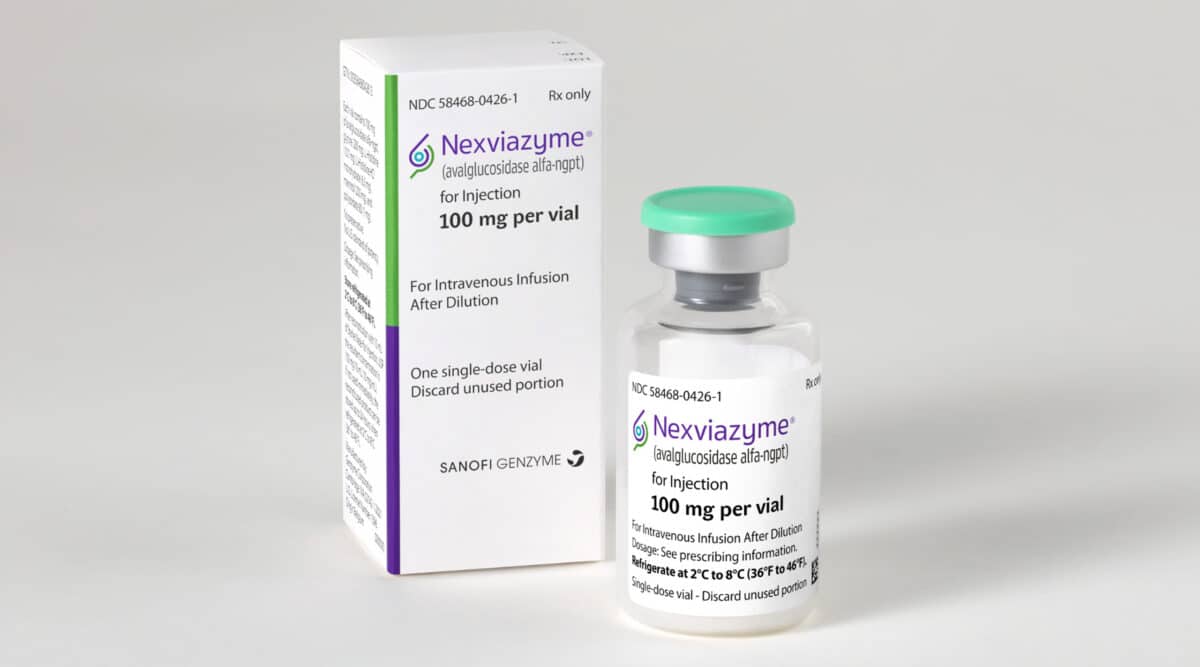Last week the FDA approved a new, INFUSED enzyme replacement therapy, Nexviazyme (avalglucosidase alfa-ngpt) from Genzyme, indicated to treat patients 1 year of age and older with late-onset Pompe disease.
Pompe disease is a progressive, multisystemic, debilitating, and often fatal neuromuscular disorder. Enzyme replacement therapy (ERT) is the only approved treatment for all patients with Pompe disease. The first enzyme treatment, Lumizyme (also from Genzyme), was approved in 2006.
There are three types of Pompe disease:
- Classic infantile onset appears within a few months of birth.
- Non-classic infantile onset appears at about 1 year of age.
- Late-onset appears later in a child’s life, or even into the teen years or adulthood.
Pompe disease is estimated to affect 1 in 40,000 in the U.S. with a genetic carrier frequency estimated at 1 in 100. In Pompe disease, mutations in the GAA gene reduce or completely eliminate an essential enzyme needed to prevent excessive lysosomal glycogen accumulation throughout the body. Patients with Pompe disease experience heart enlargement, generalized skeletal muscle weakness, and a life expectancy of less than 2 years if untreated (classic infantile and non-Classic infantile onset).
Genzyme has announced pricing for Nexviazyme similar to that of its sister drug Lumizyme. An annual course of therapy for a pediatric patient will run $330,000 and $758,000 per year for an adult patient. Details on access were not announced but it is almost certain that Nexviazyme, as with Lumizyme, will launch through specialty pharmacy distribution – direct to provider.
FDA Approves New Treatment for Pompe Disease
August 06, 2021 — Today, the U.S. Food and Drug Administration approved Nexviazyme (avalglucosidase alfa-ngpt) for intravenous infusion to treat patients 1 year of age and older with late-onset Pompe disease.
Patients with Pompe disease have an enzyme deficiency that leads to the accumulation of a complex sugar, called glycogen, in skeletal and heart muscles, which cause muscle weakness and premature death from respiratory or heart failure. Normally, glycogen—the stored form of glucose—breaks down to release glucose into the bloodstream to be used as fuel for the cells.
“Pompe disease is a rare genetic disease that causes premature death and has a debilitating effect on people’s lives,” said Janet Maynard, M.D., deputy director of the Office of Rare Diseases, Pediatrics, Urologic and Reproductive Medicine in the FDA’s Center for Drug Evaluation and Research. “Today’s approval brings patients with Pompe disease another enzyme replacement therapy option for this rare disease. The FDA will continue to work with stakeholders to advance the development of additional new, effective and safe therapies for rare diseases, including Pompe disease.”
Nexviazyme, an enzyme replacement therapy, is an intravenous medication that helps reduce glycogen accumulation. The effectiveness of Nexviazyme for the treatment of Pompe disease was demonstrated in a study of 100 patients who were randomized to take Nexviazyme or another FDA-approved enzyme replacement therapy for Pompe disease. Treatment with Nexviazyme improved lung function similar to the improvement seen with the other therapy.
The most common side effects included headache, fatigue, diarrhea, nausea, joint pain (arthralgia), dizziness, muscle pain (myalgia), itching (pruritus), vomiting, difficulty breathing (dyspnea), skin redness (erythema), feeling of “pins and needles” (paresthesia) and skin welts (urticaria). Serious reactions included hypersensitivity reactions like anaphylaxis and infusion-associated reactions, including respiratory distress, chills and raised body temperature (pyrexia). Patients susceptible to fluid volume overload or with compromised cardiac or respiratory function may be at risk for serious acute cardiorespiratory failure.
The FDA granted this application Fast Track, Priority Review and Breakthrough Therapy designations. Nexviazyme also received an orphan drug designation, which provides incentives to assist and encourage the development of drugs for rare diseases. The FDA granted the approval of Nexviazyme to Genzyme Corporation.


